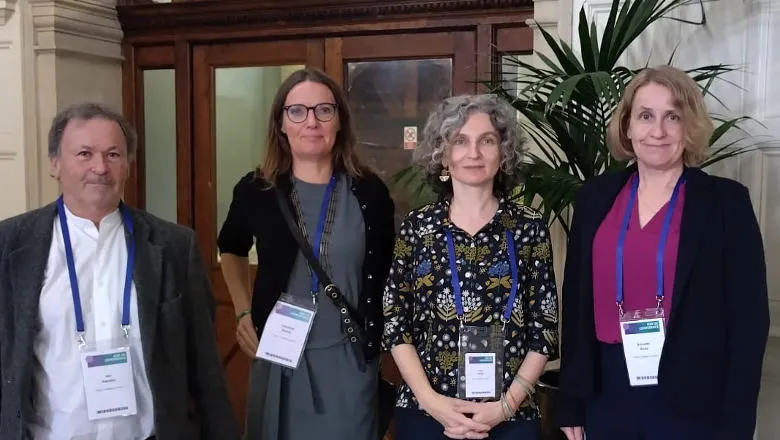17 July 2024
At HSR UK Conference 2024
Ian Kessler, Caroline Norrie, Jess Harris and Annette Boaz were in Oxford

Unit researchers Annette Boaz, Ian Kessler, Caroline Norrie and Jess Harris attended the Health Services Research (HSR) UK Conference at Oxford University, 8-10 July 2024. This was a great opportunity to meet colleagues and discuss developments in health and social care research in the new political context.
Jess presented and discussed emerging findings from the ‘Use of the Mental Capacity Act 2005 with people experiencing multiple exclusion homelessness in England’ study in a session on Complex Care and Complex Interventions (if you missed it, a Unit webinar on 18 July 2024 on the study is open to all).
The social care theme session was popular at the conference and featured Hannah Kendrick (LSE) presenting on a study led by Annette Boaz and Juliette Malley (LSE) – Research Practice Partnerships in adults social care: the influence of hybridity in provider organisations. This study compared different models of research capacity building - one in a local authority (LA), another in a care home and a third in a voluntary sector care provider. It used an ‘institutional logic’ model to compare the space between universities and institutions in developing research opportunities. A range of studies of interest to HSCWRU work were also featured in this session. Holly Walton, UCL, discussed peer supported adult social care in prisons in England and Wales. Freya Tracey and Kaat De Courte, The Health Foundation, updated attendees on the progress of the DACHA study. Finally, Lisa Irvine, University of Hertfordshire, discussed a new care home research priorities setting study focusing on what residents, policy makers and funders each want investigated, rather than seeking to gain consensus.
The conference includes dedicated workshop sessions – which proved to be popular and increased opportunities for discussion and networking. Notable sessions included a workshop led by Stephanie Tierney and Debra Westlake, University of Oxford who reflected on methodological approaches arising from their study on the implementation of social prescribing link workers in primary care: Investigating a person-centred intervention aimed at addressing health inequalities. Attendees discussed the use of a realist approach to investigate, what works, for whom and in what circumstances, in relation to social prescribers in seven case-study sites across England.
A workshop by Nick Hex and Rachael MacDonald, York Health Economic Consortium and Camille Aznar, Health Innovation Network, South London, explored Evaluating Virtual Ward (VW) Rounds. Audience members spent time in groups debating hypothetical 'preferred' VW organisation; this was followed by discussion about the practicalities of gathering real world data and evidence to support VW evaluations. Camille highlighted a comparative evaluation of VWs in South West London LAs and outlined the complexity of this work given the variation in patient/service user groups, digital features (e.g. video calls, tech support, alarm based monitoring) and staffing approaches.
The first day ended with a plenary chaired by Annette Boaz entitled, Can research help save social care? Representatives from across the UK (Patricia Higgins, Chief Executive of the Northern Ireland Social Care Council, Martin Knapp, Director of NIHR Research Programme for Social Care, Lisa Trigg, Assistant Director of Research, Data and Innovation, Social Care Wales, and Maree Allison, CEO, Scottish Social Care Council) delivered presentations highlighting features of their national context. This was followed by questions – and suggestions that comparative studies within the UK is an area currently neglected in research, but which offers opportunities for fruitful investigation. Having a plenary at HSRUK dedicated to social care felt like a great step forward for social care research in the UK.
A highlight of the second day was the Plenary Session on ‘Bridging the divide between involvement and inclusivity in health services research’, which was co-chaired by HSCWRU PCIE Advisory Group member, Lynn Laidlaw.
We look forward to returning to the conference to share Unit research next year!





